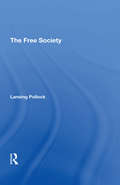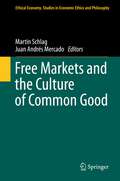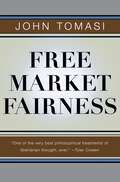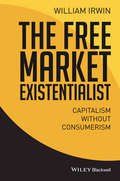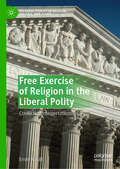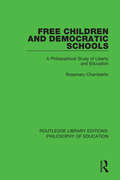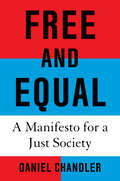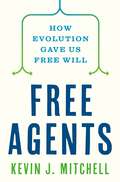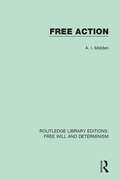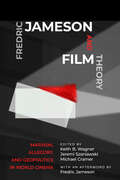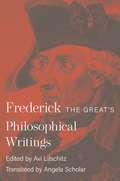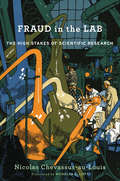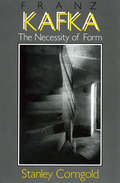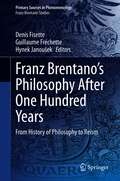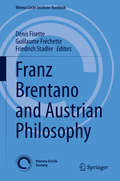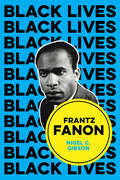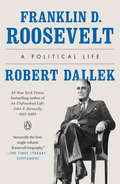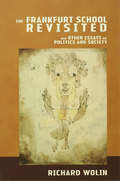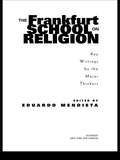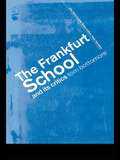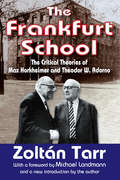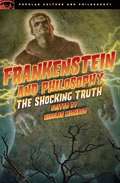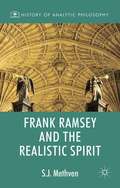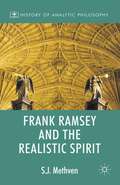- Table View
- List View
The Free Society
by Lansing PollockIn the tradition of Milton Friedman’s 1962 classic, Capitalism and Freedom, Lansing Pollock draws on moral, political, and economic theory to defend a libertarian vision of the good society. Pollock argues that mutual consent, derived from a fundamental Kantian moral equality, is the ideal standard for judging relations between persons. He contends that if the equal right of all persons to be free is taken seriously, most of the coercion by government that many take for granted is immoral. Pollock situates libertarian moral theory in an American historical context, one compatible with the views of James Madison and Thomas Jefferson. Pollock argues that when the Constitution is interpreted according to the political philosophy of the framers, the modern welfare state is unconstitutional. Pollock goes on to demonstrate how free market economies promote human well-being, whereas government regulation is often counterproductive. In advocating a reduction in the size and scope of government, Pollock includes applied policy analyses of poverty and health care, among other topical issues. He also offers an innovative solution to the problem of funding a limited government without violating individual rights. The strength of The Free Society lies in its synthetic achievement. In a book that is accessibly written and sure to appeal to scholar and lay reader alike, Pollock provides a compelling conception of the good society—one in which the libertarian vision includes moral, social, political, and economic perspectives.
Free Markets and the Culture of Common Good
by Juan Andrés Mercado Martin SchlagRecent economic development and the financial and economic crisis require a change in our approach to business and finance. This book combines theology, economy and philosophy in order to examine in detail the idea that the functioning of a free market economy depends upon sound cultural and ethical foundations. The free market is a cultural achievement, not only an economic phenomenon subject to technical rules of trade and exchange. It is an achievement which lives by and depends upon the values and virtues shared by the majority of those who engage in economic activity. It is these values and virtues that we refer to as culture. Trust, credibility, loyalty, diligence, and entrepreneurship are the values inherent in commercial rules and law. But beyond law, there is also the need for ethical convictions and for global solidarity with developing countries. This book offers new ideas for future sustainable development and responds to an increasing need for a new sense of responsibility for the common good in societal institutions and good leadership.
Free Market Fairness
by John TomasiA provocative new vision of free market capitalism that achieves liberal ends by libertarian meansCan libertarians care about social justice? In Free Market Fairness, John Tomasi argues that they can and should. Drawing simultaneously on moral insights from defenders of economic liberty such as F. A. Hayek and advocates of social justice such as John Rawls, Tomasi presents a new theory of liberal justice. This theory, free market fairness, is committed to both limited government and the material betterment of the poor. Unlike traditional libertarians, Tomasi argues that property rights are best defended not in terms of self-ownership or economic efficiency but as requirements of democratic legitimacy. At the same time, he encourages egalitarians concerned about social justice to listen more sympathetically to the claims ordinary citizens make about the importance of private economic liberty in their daily lives. In place of the familiar social democratic interpretations of social justice, Tomasi offers a "market democratic" conception of social justice: free market fairness. Tomasi argues that free market fairness, with its twin commitment to economic liberty and a fair distribution of goods and opportunities, is a morally superior account of liberal justice. Free market fairness is also a distinctively American ideal. It extends the notion, prominent in America's founding period, that protection of property and promotion of real opportunity are indivisible goals. Indeed, according to Tomasi, free market fairness is social justice, American style.Provocative and vigorously argued, Free Market Fairness offers a bold new way of thinking about politics, economics, and justice—one that will challenge readers on both the left and right.
The Free Market Existentialist
by William IrwinIncisive and engaging, The Free Market Existentialist proposes a new philosophy that is a synthesis of existentialism, amoralism, and libertarianism. Argues that Sartre's existentialism fits better with capitalism than with Marxism Serves as a rallying cry for a new alternative, a minimal state funded by an equal tax Confronts the "final delusion" of metaphysical morality, and proposes that we have nothing to fear from an amoral world Begins an essential conversation for the 21st century for students, scholars, and armchair philosophers alike with clear, accessible discussions of a range of topics across philosophy including atheism, evolutionary theory, and ethics
Free Exercise of Religion in the Liberal Polity: Conflicting Interpretations (Palgrave Studies in Religion, Politics, and Policy)
by Emily R. GillThis book addresses the challenge of providing for the free exercise of religion without allowing religious exercise by some individuals and groups to impinge upon the conscientious convictions of others. State neutrality toward religion is impossible, because neutrality means inattention to religion for some, but leveling the playing field through accommodations or exemptions for others. Both formal and substantive neutrality have a place in addressing particular conflicts. One such example is public funding for religiously affiliated social service programs, for which neither type of neutrality is satisfactory and thus some restrictions are justifiable; conversely, private voluntary organizations that do not receive direct public funding should be allowed wide latitude regarding their practices. This title also examines the expansive free exercise claims that are now made by those who argue that following the law impinges upon their beliefs, as exemplified by the ministerial exception and the Hobby Lobby and Masterpiece Cakeshop Supreme Court cases. It concludes by analyzing the relationship between neutrality and marriage as a civil status, which impacts a variety of commitment types and plural marriage.
Free Children and Democratic Schools: A Philosophical Study of Liberty and Education (Routledge Library Editions: Philosophy of Education #6)
by Rosemary ChamberlinThis book, first published in 1989, relates a theory of liberty to the practice of education, and reveals the implications of beliefs about freedom for our schools and classrooms. The author makes a reasoned plea for society to have more respect for children and not treat them as an inferior sub-species. The central argument of this book is for greater education in democracy, and greater democracy in education. This title will be of interest to students of the philosophy of education.
The Free Animal
by Lee MacleanFree will is a key but contested concept in the work of Jean-Jacques Rousseau: while the famed philosopher is known to have asserted that free will distinguishes human beings from animals, several interpreters have argued that he merely pretends to have this belief for the sake of healthy politics and to avoid persecution by religious authorities. Through careful readings of key texts and letters, The Free Animal offers a new and original exploration of Rousseau's views on free will.Lee MacLean shows that Rousseau needs and uses the idea of human consciousness of free will to explain the development of morality, convention, and vice. MacLean bases her argument on a broad range of texts, from canonical works to Rousseau's untranslated letters and drafts. Featuring careful analyses and an extensive engagement with the secondary literature, The Free Animal offers a novel interpretation of the changing nature and complexity of Rousseau's intention.
Free and Equal: A Manifesto for a Just Society
by Daniel ChandlerImagine: You are designing a society, but you don't know who you'll be within it—rich or poor, man or woman, gay or straight. What would you want that society to look like? This is the revolutionary thought experiment proposed by the twentieth century's greatest political philosopher, John Rawls. As economist and philosopher Daniel Chandler argues in this hugely ambitious and exhilarating manifesto, it is by rediscovering Rawls that we can find a way out of the escalating crises that are devastating our world today.&“A beautifully written and compelling argument that Rawlsian political philosophy can heal our broken societies.&”—Sir Angus Deaton, winner of the Nobel Prize in Economics • "This book will meet a very important need.&”—Amartya Sen, winner of the Nobel Prize in Economics"Intellectually rigorous and full of hope.&”—Zadie Smith, bestselling author of White Teeth and The Fraud • &“A must-read!&”—Thomas Piketty, bestselling author of Capital in the Twenty-First CenturyTaking Rawls's humane and egalitarian liberalism as his starting point, Chandler builds a powerful case for a new progressive agenda that would fundamentally reshape our societies for the better. He shows how we can protect free speech and transcend the culture wars; get money out of politics; and create an economy where everyone has the chance to fulfil their potential, where prosperity is widely shared, and which operates within the limits of our finite planet.This is a book brimming with hope and possibility—a galvanizing alternative to the cynicism that pervades our politics. Free and Equal has the potential to offer a touchstone for a modern, egalitarian liberalism for many years to come, cementing Rawls's place in political discourse, and firmly establishing Chandler as a vital new voice for our time.
Free Agents: How Evolution Gave Us Free Will
by Kevin J. MitchellAn evolutionary case for the existence of free willScientists are learning more and more about how brain activity controls behavior and how neural circuits weigh alternatives and initiate actions. As we probe ever deeper into the mechanics of decision making, many conclude that agency—or free will—is an illusion. In Free Agents, leading neuroscientist Kevin Mitchell presents a wealth of evidence to the contrary, arguing that we are not mere machines responding to physical forces but agents acting with purpose.Traversing billions of years of evolution, Mitchell tells the remarkable story of how living beings capable of choice arose from lifeless matter. He explains how the emergence of nervous systems provided a means to learn about the world, granting sentient animals the capacity to model, predict, and simulate. Mitchell reveals how these faculties reached their peak in humans with our abilities to imagine and to be introspective, to reason in the moment, and to shape our possible futures through the exercise of our individual agency. Mitchell’s argument has important implications—for how we understand decision making, for how our individual agency can be enhanced or infringed, for how we think about collective agency in the face of global crises, and for how we consider the limitations and future of artificial intelligence.An astonishing journey of discovery, Free Agents offers a new framework for understanding how, across a billion years of Earth history, life evolved the power to choose, and why it matters.
Free Action (Routledge Library Editions: Free Will and Determinism #3)
by A.I. MeldenThat a science of human conduct is possible, that what any man may do even in moments of the most sober and careful reflection can be understood and explained, has seemed to many a philosopher to cast doubt upon our common view that any human action can ever be said to be truly free. This book, first published in 1961, looks into crucially important issues that are often ignored in the familiar arguments for and against the possibility of free action. These issues are brought to light and examined in some detail.
Fredric Jameson and Film Theory: Marxism, Allegory, and Geopolitics in World Cinema
by Dudley Andrew John Mackay Paul Coates Pansy Duncan Naoki Yamamoto Keith B. Wagner Michael Cramer Mercedes Vazquez Alvin K. Wong Dan Hassler-Forest Mike Wayne Jeremi Szaniawski Fredric JamesonFrederic Jameson and Film Theory is the first collection of its kind, it assesses and critically responds to Fredric Jameson’s remarkable contribution to film theory. The essays assembled explore key Jamesonian concepts—such as totality, national allegory, geopolitics, globalization, representation, and pastiche—and his historical schema of realism, modernism, and postmodernism, considering, in both cases, how these can be applied, revised, expanded and challenged within film studies. Featuring essays by leading and emerging voices in the field, the volume probes the contours and complexities of neoliberal capitalism across the globe and explores world cinema's situation within these forces by deploying and adapting Jamesonian concepts, and placing them in dialogue with other theoretical paradigms. The result is an innovative and rigorously analytical effort that offers a range of Marxist-inspired approaches towards cinemas from Asia, Latin America, Europe, and North America in the spirit of Jameson's famous rallying cry: 'always historicize!'.
Frederick the Great's Philosophical Writings
by King Frederick IIThe first modern English edition of diverse Enlightenment-era writings by Prussian monarch Frederick the GreatFrederick II of Prussia (1712–1786), best known as Frederick the Great, was a prolific writer of philosophical discourses, poems, epics, satires, and more, while maintaining extensive correspondence with prominent intellectuals, Voltaire among them. This edition of selected writings, the first to make a wide range of Frederick’s most important ideas available to a modern English readership, moves beyond traditional attempts to see his work only in light of his political aims. In these pages, we can finally appreciate Frederick’s influential contributions to the European Enlightenment—and his unusual role as a monarch who was also a published author.In addition to Frederick’s major opus, the Anti-Machiavel, the works presented here include essays, prefaces, reviews, and dialogues. The subjects discussed run the gamut from ethics to religion to political theory. Accompanied by critical annotations, the texts show that we can understand Frederick’s views of kingship and the state only if we engage with a broad spectrum of his thought, including his attitudes toward morality and self-love. By contextualizing his arguments and impact on Enlightenment beliefs, this volume considers how we can reconcile Frederick’s innovative public musings with his absolutist rule. Avi Lifschitz provides a robust and detailed introduction that discusses Frederick’s life and work against the backdrop of eighteenth-century history and politics.With its unparalleled scope and cross-disciplinary appeal, Frederick the Great’s Philosophical Writings firmly establishes one monarch’s multifaceted relevance for generations of readers and scholars to come.
Fraud in the Lab: The High Stakes of Scientific Research
by Nicolas Chevassus-au-LouisFrom manipulated results and fake data to retouched illustrations and plagiarism, cases of scientific fraud have skyrocketed in the past two decades. In a damning exposé, Nicolas Chevassus-au-Louis details the circumstances enabling the decline in scientific standards and highlights efforts to curtail future misconduct.
Franz Kafka: The Necessity of Form
by Stanley CorngoldIn Stanley Corngold’s view, the themes and strategies of Kafka’s fiction are generated by a tension between his concern for writing and his growing sense of its arbitrary character. Analyzing Kafka’s work in light of "the necessity of form," which is also a merely formal necessity, Corngold uncovers the fundamental paradox of Kafka’s art and life. The first section of the book shows how Kafka’s rhetoric may be understood as the daring project of a man compelled to live his life as literature. In the central part of the book, Corngold reflects on the place of Kafka within the modern tradition, discussing such influential precursors of Cervantes, Flaubert, and Nietzsche, whose works display a comparable narrative disruption. Kafka’s distinctive narrative strategies, Corngold points out, demand interpretation at the same time they resist it. Critics of Kafka, he says, must be aware that their approaches are guided by the principles that Kafka’s fiction identifies, dramatizes, and rejects.
Franz Brentano’s Philosophy After One Hundred Years: From History of Philosophy to Reism (Primary Sources in Phenomenology)
by Denis Fisette Guillaume Fréchette Hynek JanoušekThis volume brings together contributions that explore the philosophy of Franz Brentano. It looks at his work both critically and in the context of contemporary philosophy. For instance, Brentano influenced the phenomenology of Edmund Husserl, the theory of objects of Alexius Meinong, the early development of the Gestalt theory, the philosophy of language of Anton Marty, the works of Carl Stumpf in the psychology of tone, and many others. Readers will also learn the contributions of Brentano's work to much debated contemporary issues in philosophy of mind, ontology, and the theory of emotions. The first section deals with Brentano’s conception of the history of philosophy. The next approaches his conception of empirical psychology from an empirical standpoint and in relation with competing views on psychology from the period. The third section discusses Brentano’s later programme of a descriptive psychology or “descriptive phenomenology” and some of his most innovative developments, for instance in the theory of emotions. The final section examines metaphysical issues and applications of his mereology. His reism takes here an important place. The intended readership of this book comprises phenomenologists, analytic philosophers, philosophers of mind and value, as well as metaphysicians. It will appeal to both graduate and undergraduate students, professors, and researchers in philosophy and psychology.
Franz Brentano and Austrian Philosophy (Vienna Circle Institute Yearbook #24)
by Denis Fisette Guillaume Fréchette Friedrich StadlerThe book discusses Franz Brentano’s impact on Austrian philosophy. It contains both a critical reassessment of Brentano’s place in the development of Austrian philosophy at the turn of the 20th century and a reevaluation of the impact and significance of his philosophy of mind or ‘descriptive psychology’ which was Brentano's most important contribution to contemporary philosophy and to the philosophy in Vienna. In addition, the relation between Brentano, phenomenology, and the Vienna Circle is investigated, together with a related documentation of Brentano's disciple Alfred Kastil (in German). The general part deals with the ongoing discussion of Carnap's "Aufbau" (Vienna Circle Lecture by Alan Chalmers) and the philosophy of mind, with a focus on physicalism as discussed by Carnap and Wittgenstein (Gergely Ambrus). As usual, two reviews of recent publications in the philosophy of mathematics (Paolo Mancosu) and research on Otto Neurath's lifework (Jordi Cat/Adam Tuboly) are included as related research contributions. This book is of interest to students, historians, and philosophers dealing with the history of Austrian and German philosophy in the 19th and 20th century.
Frantz Fanon: Combat Breathing (Black Lives)
by Nigel C. GibsonRevolutionary humanist and radical psychiatrist Frantz Fanon was one of the greatest Black thinkers of the twentieth century. Born in Martinique and known for his involvement in the Algerian liberation movement, his seminal books Black Skin, White Masks and The Wretched of the Earth are widely considered to be cornerstones of anti-colonial and anti-racist thought.In this essential introduction to Fanon’s remarkable life and philosophy, Nigel C. Gibson argues that Fanon’s oeuvre is essential to thinking about race today. Connecting Fanon’s writing, psychiatric practice, and lived experience in the Caribbean, France, and Africa, Gibson reveals (with startling clarity) his philosophical commitments and the vision of revolution that he stood for. Despite his untimely death, the revolutionary pulse of Fanon’s ideas has continued to beat ever more strongly in the consciousness of successive revolutionary generations, from the Black Panthers and the Black Power to Black Lives Matter.As Fanon’s thought comes alive to new activists thinking about their mission to “humanize the world,” Gibson reminds us that that Fanon’s revolutionary humanism is fundamental to all forms of anti-colonial struggle, including our own.
Franklin D. Roosevelt: A Political Life
by Robert Dallek“In a period defined by division, gridlock and tweet storms, Dallek crafts a pointillist portrait of the four-term president” —Peter M. Gianotti, Newsday“Will rank among the standard biographies of its subject” —Publishers WeeklyA one-volume biography of Roosevelt by the #1 New York Times bestselling biographer of JFK, focusing on his career as an incomparable politician, uniter, and deal maker In an era of such great national divisiveness, there could be no more timely biography of one of our greatest presidents than one that focuses on his unparalleled political ability as a uniter and consensus maker. Robert Dallek’s Franklin D. Roosevelt: A Political Life takes a fresh look at the many compelling questions that have attracted all his biographers: how did a man who came from so privileged a background become the greatest presidential champion of the country’s needy? How did someone who never won recognition for his intellect foster revolutionary changes in the country’s economic and social institutions? How did Roosevelt work such a profound change in the country’s foreign relations? For FDR, politics was a far more interesting and fulfilling pursuit than the management of family fortunes or the indulgence of personal pleasure, and by the time he became president, he had commanded the love and affection of millions of people. While all Roosevelt’s biographers agree that the onset of polio at the age of thirty-nine endowed him with a much greater sense of humanity, Dallek sees the affliction as an insufficient explanation for his transformation into a masterful politician who would win an unprecedented four presidential terms, initiate landmark reforms that changed the American industrial system, and transform an isolationist country into an international superpower. Dallek attributes FDR’s success to two remarkable political insights. First, unlike any other president, he understood that effectiveness in the American political system depended on building a national consensus and commanding stable long-term popular support. Second, he made the presidency the central, most influential institution in modern America’s political system. In addressing the country’s international and domestic problems, Roosevelt recognized the vital importance of remaining closely attentive to the full range of public sentiment around policy-making decisions—perhaps FDR’s most enduring lesson in effective leadership.
The Frankfurt School Revisited: And Other Essays On Politics And Society
by Richard WolinThis volume is a collection of essays by Richard Wolin, a leading political theorist and intellectual historian. It is the follow up to Wolin’s two recent, widely acclaimed books: Heidegger’s Children and The Seduction of Unreason. In those books, he explored the legacy of Martin Heidegger and his impact on some of his most influential and notable students. He dealt particularly with the effect that Heidegger’s subsequent embrace of fascism and National Socialism had on these students. Delving further in his next book, Wolin explored the question of why philosophers and intellectuals have been drawn to antiliberal, antidemocratic fascism. The essays in this book are focused on European Political Thought particularly with figures associated with the Frankfurt School. The collection represents a virtual who’s who of European political thinkers with essays on Walter Benjamin, Adorno, Marcuse, Arendt, Heidegger, Weber, Jaspers, and Carl Schmitt. Moving beyond these thinkers and those books, this collection will also include essays on contemporary political issues such as post-communist revolutions, human rights, global democracy, the revival of republicanism, and religion and public life.
The Frankfurt School on Religion: Key Writings by the Major Thinkers
by Eduardo MendietaIn "The Frankfurt School on Religion," Eduardo Mendieta has brought together a collection of readings and essays revealing both the deep connections that the Frankfurt School has always maintained with religion as well as the significant contribution that its work has to offer. Rather than being unanimously antagonistic towards religion as has been the received wisdom, this collection shows the great diversity of responses that individual thinkers of the school developed and the seriousness and sophistication with which they engaged the core religious issues and major religious traditions. Through a careful selection of writings from eleven prominent theorists, including several new and previously untranslated pieces from Leo Lowenthal, Max Horkheimer, Herbert Marcuse, and Jurgen Habermas, this volume provides much needed sources for religious leaders, philosophers, and social theorists as they grapple with the nature and functions of religion in the contemporary social, political, and economic landscape. "The Frankfurt School on Religion" recovers the religious dimensions of the Frankfurt School, for too long sidelined or ignored, and offers new perspectives and insights necessary to the development of a fuller and more nuanced critical theory of society. Selections and essays from: Ernst Bloch, Erich Fromm, Leo Lowenthal, Herbert Marcuse, Theodor W. Adorno, Max Horkheimer, Walter Benjamin, Johann Baptist Metz, Jurgen Habermas, Helmut Peukert, Edmund Arens.
The Frankfurt School and its Critics (Key Sociologists)
by The late BottomoreThe Institute of Social Research, from which the Frankfurt School developed, was founded in the early years of the Weimar Republic. It survived the Nazi era in exile, to become an important centre of social theory in the postwar era. Early members of the school, such as Adorno, Horkheimer and Marcuse, developed a form of Marxist theory known as Critical Theory, which became influential in the study of class, politics, culture and ideology. The work of more recent members, and in particular Habermas, has received wide attention throughout Europe and North America. Tom Bottomore's study takes a new and controversial look at the contributions of the Frankfurt School to modern sociology, examining several issues not previously discussed elsewhere. He discusses the neglect of history and political economy by the critical theorists, and considers the relationship of the later Frankfurt School to the radical movements of the 1960s and the present time. His critical analysis makes the school's writers accessible, through an assessment of their work and an exploration of the relationship of Critical Theory to other forms of sociological thought, especially positivism and structuralism.
The Frankfurt School: The Critical Theories of Max Horkheimer and Theodor W. Adorno
by Zoltan TarrThe Frankfurt School refers to a school of neo-Marxist interdisciplinary social theory particular established at the Institute for Social Research at the University of Frankfurt, Germany in 1923. Tarr's investigation focuses on three key issues. The first is the Frankfurt School's original program of providing a general theory of modern capitalist society. The second is the claim to represent a continuation of the original Marxian theory through the school's Critical Theory. The third is the scientific validity of Critical Theory in light of the generally accepted canons of the natural and social sciences.Tarr proposes that in the last analysis, Critical Theory is simply another existentialist philosophy. As such, it is a specific expression of certain socio-historical conditions and of the situation of a particular social group, the marginal Jewish bourgeois intelligentsia of Central Europe. This European-Jewish contribution became apparent after the great metaphysical impulse of the pre-Socratic and Platonic-Aristotelian philosophies had run their respective courses. Both philosophies represented philosophical schools of ethics, and both wanted to help man take up a defense against the storms of passions and fate. It was from these ancient sources that the Frankfurt School emerged.The Frankfurt School derived its impetus in the twentieth century, in which Tarr claims a shift occurred from the ontological to the subjective realm. This in turn led to deep changes in philosophical theory and practice which led to a more psychologically oriented mode of social thought. This in-depth study covers the entire career of the Frankfurt School's Critical Theory from 1923 to 1974. It does so by applying the same standards of criticism to its primary doctrines as it turned on other theories, but with a keen sense of balance and fairness.
Frankenstein and Philosophy
by Nicolas MichaudMary Shelley's novel Frankenstein: The Modern Prometheus sparked into life a fascination with science-gone-awry that refuses to die. From 1818 to present-day Hollywood, the story of Victor Frankenstein and his reanimated, stitched-together corpse has inspired (some would say) the very idea of modern science fiction and countless essays, movies, novels, songs, comic-books, and TV shows aiming to capture what was right, wrong, abominable, inevitable, scary, or funny in this classic tale.Can organic life be reanimated using electricity or genetic manipulation? If so, could Frankenstein's monster really teach itself to read and speak as Mary Shelley imagined? Do monsters have rights, or responsibilities to those who would as soon kill them? What is it about music that so affects Frankenstein's monster, or any of us? What does Mel Brook's Frau Blucher say to contemporary eco-feminism? Why are some Frankenstein's flops and others historic successes? Is there a true Frankenstein? Why are children, but not adults, drawn to Shelley's monster? And what is a "monster," anyways?Frankenstein and Philosophy brings 25 philosophers to stitch together these and other questions as they apply the history of philosophy to history's greatest horror franchise. Some chapters treat the Frankenstein films, others the original novel, and yet others the many comic books, novels, and modern adaptations. Together they pay tribute to perhaps the most enduring pop culture icon and the fundamental fears, hopes, questions, and puzzles it raises.
Frank Ramsey and the Realistic Spirit (History of Analytic Philosophy)
by S. J. MethvenFrank Ramsey and the Realistic Spirit.
Frank Ramsey and the Realistic Spirit (History of Analytic Philosophy)
by Steven MethvenThis book attempts to explicate and expand upon Frank Ramsey's notion of the realistic spirit. In so doing, it provides a systematic reading of his work, and demonstrates the extent of Ramsey's genius as evinced by both his responses to the Tractatus Logico-Philosophicus, and the impact he had on Wittgenstein's later philosophical insights.
